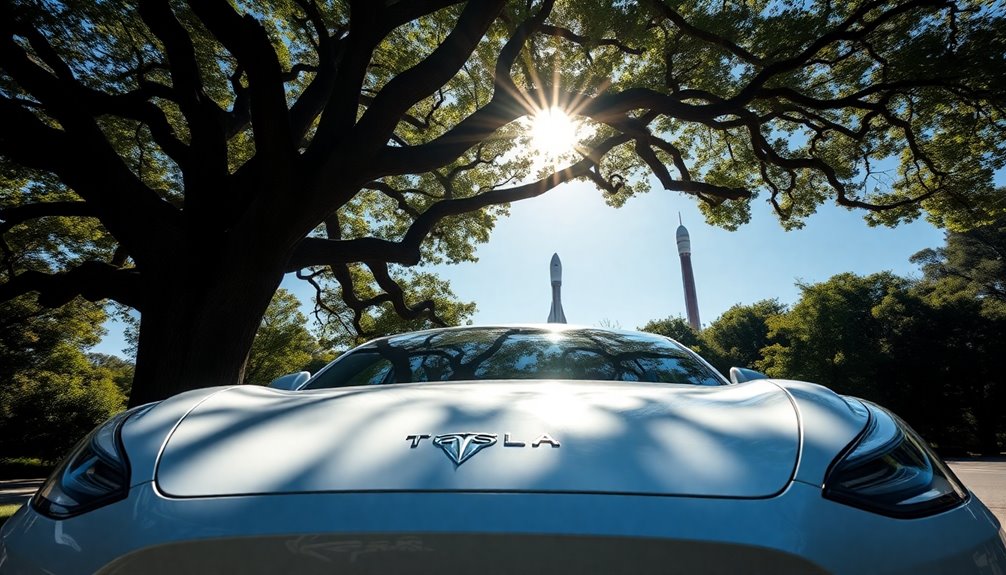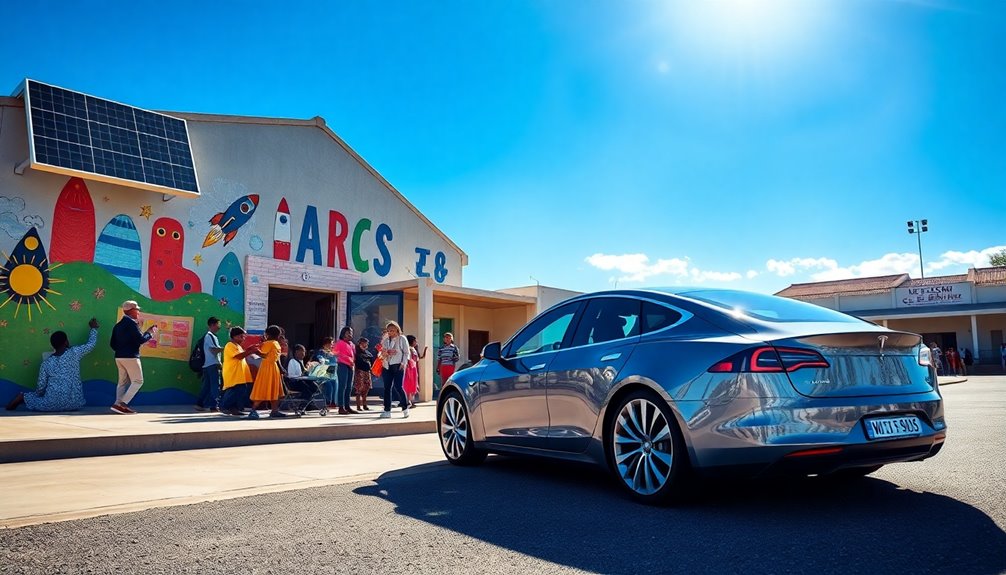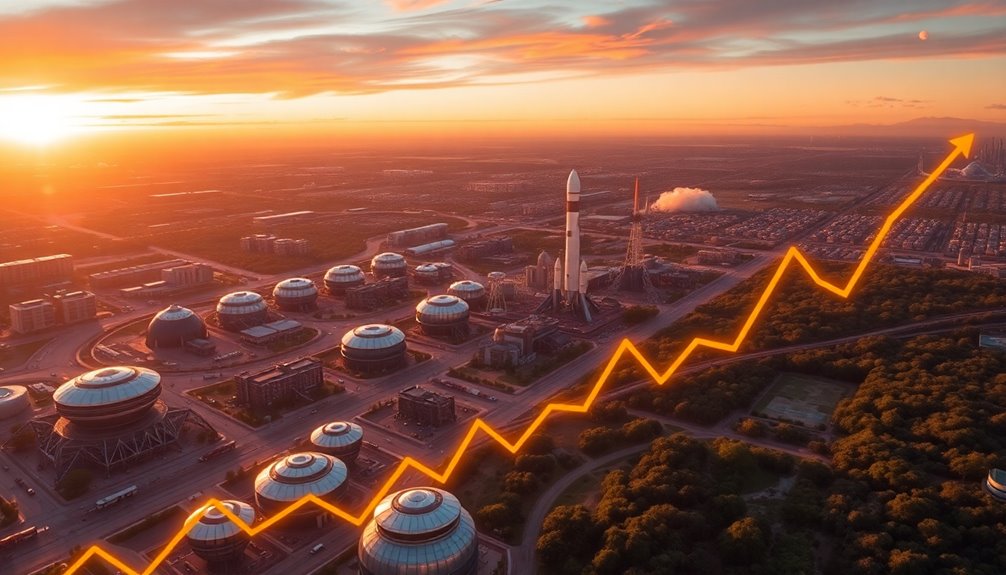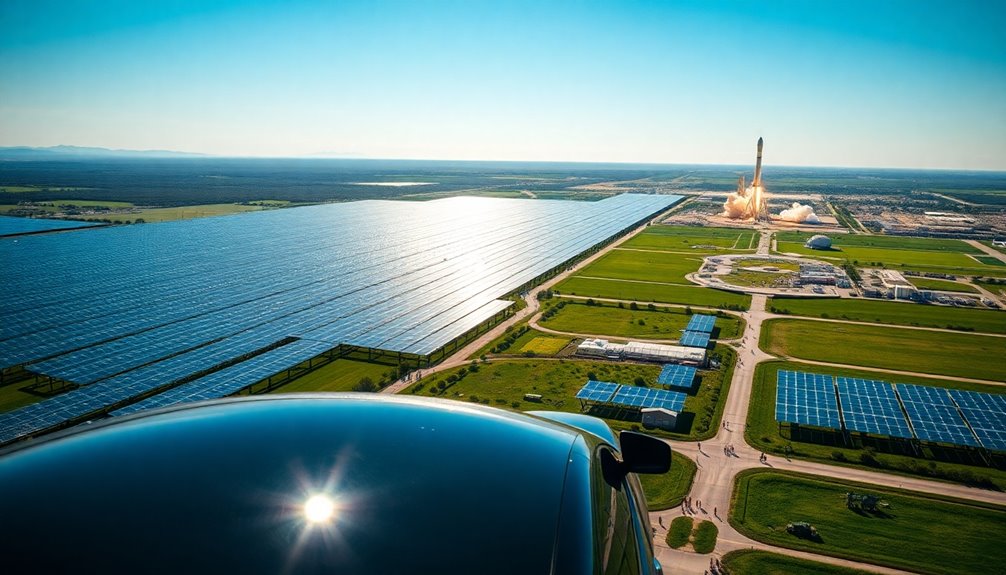Elon Musk's fortune is truly astonishing, soaring to about $376 billion! His journey began with early tech ventures like Zip2, which he co-founded, helping him earn millions. A big part of his wealth comes from Tesla, where he holds a huge stake. Musk's lifestyle is surprising too; he lives in a rented home, despite owning a private jet and fancy cars. Alongside this, he's faced public criticism over controversial tweets. Yet, he also donates generously to education. Musk's ambitious goals, like colonizing Mars, add to the excitement. Get ready to uncover more surprising details about his fascinating life!
Key Takeaways
- Elon Musk's net worth surged by $105 billion in just one year, primarily due to Tesla's impressive stock performance.
- Musk holds a 13% stake in Tesla, contributing over $100 billion to his wealth.
- SpaceX significantly boosts Musk's fortune, with an estimated value of around $71 billion.
- Following the acquisition of X (formerly Twitter), Musk faced controversies that drastically reduced the platform's value from $44 billion to $9.4 billion.
- Musk's investments focus on innovative technologies and sustainable energy, with ambitious projects like Mars colonization and electric transportation systems.
Introduction

In the late 20th century, Elon Musk began a journey that would transform various industries and redefine innovation. You might think of him as just the guy behind Tesla or SpaceX, but his story starts much earlier. In 1995, he founded a company called Zip2, which helped businesses get online with maps and directories—kind of like what we see today on Google! This venture was a huge success and was sold for $307 million, making Musk $22 million richer. Largest sum for an Internet company at that time was a significant milestone in his early career.
But he didn't stop there. In 1999, he co-founded X.com, an online banking service that later became PayPal after merging with another company. When eBay bought PayPal for $1.5 billion in 2002, Musk added another $175.8 million to his fortune.
With all that money, he didn't just relax. Instead, he founded SpaceX and helped create Tesla, focusing on electric cars and sustainable energy. His adventures didn't end there—he also started companies like Neuralink and The Boring Company. As you can see, Musk's journey is filled with impressive achievements that continue to shape our world today!
Early Life and Background

Elon Musk's journey toward becoming a tech mogul started long before his groundbreaking ventures like Tesla and SpaceX. Born on June 28, 1971, in Pretoria, South Africa, Elon grew up in a wealthy area during apartheid. His parents, Maye and Errol Musk, had impressive careers, but their financial situation changed after they moved to Toronto. Maye worked multiple jobs to support Elon and his siblings, Kimbal and Tosca, especially after their parents divorced when Elon was just ten.
Elon faced challenges in school, where he was bullied until he learned self-defense. He developed a love for technology early on, teaching himself computer programming at age 12. By selling a video game for $500, he showcased his entrepreneurial spirit. At 17, he moved to Canada to escape mandatory military service and focus on his education. Initially attending Queen's University, he later transferred to the University of Pennsylvania, earning degrees in physics and economics. Although he briefly enrolled in a Ph.D. program at Stanford, he chose to pursue his business dreams, setting the stage for his future successes. His decision to leave academia came just after he was accepted into Stanford's Ph.D. program, demonstrating his commitment to entrepreneurship.
Estimated Net Worth

With an estimated net worth around $376 billion as of December 2024, Elon Musk has solidified his status as one of the wealthiest individuals in the world. His wealth skyrocketed by $105 billion this year, mainly due to Tesla's impressive stock performance. In November 2024, the Bloomberg Billionaires Index estimated his net worth at approximately $335 billion. That's more than the market value of companies like Netflix and Salesforce!
Most of Musk's fortune comes from a 13% stake in Tesla, which is valued at over $100 billion. He also has significant wealth from SpaceX, worth around $71 billion, and ownership of X (formerly Twitter), valued at about $9.4 billion. Musk's artificial intelligence company, xAI, adds around $12 billion to his net worth too. Additionally, his wealth rise is attributed to Tesla's stock performance which surged 56% this year.
In just one day in November 2024, his net worth jumped by nearly $21 billion after Tesla's stock rose by 9%. Overall, his journey from $27.6 billion in 2020 to over $300 billion in 2024 shows how Tesla's growth has greatly impacted his wealth. It's a remarkable story of success!
Lifestyle and Spending Habits

A billionaire's lifestyle often reflects their immense wealth, and Musk's spending habits are no exception. He owns a private jet, the Gulfstream G650ER, worth around $70 million. This luxury helps him travel efficiently for work and business. Musk also has a taste for unique items, like the James Bond submarine car from *The Spy Who Loved Me*, which he bought for $920,000. His collection of luxury cars includes a Jaguar E-Type and a McLaren.
While Musk loves high-end toys, he doesn't indulge in extravagant vacations or expensive hobbies. Instead, he lives in a rented $50,000 home in Boca Chica, Texas, from SpaceX. In 2020, he sold seven homes in California for a whopping $128 million, showing he prefers to focus on his work, particularly Mars colonization. Additionally, his decision to eliminate property ownership emphasizes his commitment to investing in future space projects rather than material possessions. Musk's prioritization of financial management reflects a strategic approach to his wealth, ensuring that his resources are allocated toward innovation rather than unnecessary expenditures.
His daily routine is busy, starting with a doughnut around 9 a.m. and ending around 3 a.m. after long work hours. He uses his jet to travel between Tesla and SpaceX locations, always prioritizing efficiency and convenience. With such habits, Musk balances luxury with a strong work ethic.
Founding Zip2 Corporation

In 1995, Musk and his brother Kimbal, along with Greg Kouri, co-founded Zip2 Corporation in Palo Alto, California, aiming to revolutionize the way local businesses connected with customers online. Originally named Global Link Information Network, Inc., they quickly changed it to Zip2 in 1996 after securing $3 million in investments from Mohr Davidow Ventures.
Zip2 provided online city guides and maps for newspapers, helping local businesses establish an online presence. They partnered with over 160 newspapers, including big names like The New York Times and Hearst Corporation. Their services included online directories, calendars, and even email, making it easier for customers to find what they needed.
One of their exciting products was "Auto Guide," which connected users with car sellers. They combined business listings with mapping capabilities, allowing two-way communication between users and advertisers. This meant users could message advertisers directly, enhancing customer engagement.
Though they tried to merge with CitySearch in 1998, it didn't work out. Ultimately, Compaq Computer Corporation acquired Zip2 in 1999 for a whopping $307 million, making a significant impact on Musk's fortune. Zip2 marked the beginning of Musk's entrepreneurial journey in tech, laying the groundwork for future ventures.
Multiple Business Ventures

Entrepreneurial spirit drives Elon Musk's multiple business ventures, each aimed at pushing the boundaries of technology and sustainability. One of his first successes came with X.com, which he founded to offer online financial services. This company later merged with Confinity to become PayPal, making it easy for people to complete secure transactions on the Internet. eBay bought PayPal for $1.5 billion in 2002, netting Musk significant profits.
Next, Musk founded Tesla Motors to create eco-friendly electric cars. The Tesla Roadster, an electric sports car, put the company on the map. As of Q3 2024, Tesla holds a whopping 48% of the U.S. electric vehicle market, thanks to popular models like the Model Y and refreshed Model 3. Furthermore, the U.S. EV market share reached 8.9% in Q3 2024, reflecting a growing consumer interest in electric vehicles. Musk's commitment to sustainable energy has been a driving force behind Tesla's rapid growth and innovation.
In addition, Musk co-founded SolarCity to promote solar power. This company offers affordable solar panel installations, helping reduce carbon footprints, and later became part of Tesla Energy.
Musk's other ventures include Neuralink, the Boring Company, and even Twitter, which he rebranded to X. He also co-founded OpenAI and invests in the Musk Foundation, focusing on safe AI and renewable energy. Musk's innovative ideas keep pushing the envelope!
SpaceX's First Successful Launch

On September 28, 2008, SpaceX achieved a monumental milestone with the successful launch of Falcon 1, marking the first time a privately funded, fully liquid-fueled rocket reached orbit. This launch took place from Omelek Island in the Marshall Islands, and it was a game-changer for the space industry, which had been dominated by government programs.
Falcon 1 was a two-stage rocket. The first stage acted as a booster, pushing the rocket high into the sky before it detached. The second stage then took over and continued the journey into orbit. This successful launch was crucial for SpaceX, as it prevented bankruptcy and secured funding from investors, including Peter Thiel. Following this success, SpaceX began to focus on developing larger rockets, which would ultimately lead to the creation of Falcon 9 and Dragon spacecraft.
Thanks to this achievement, SpaceX could develop larger rockets like the Falcon 9 and Dragon spacecraft. It also set the stage for NASA's Commercial Orbital Transportation Services contracts, proving that private companies could compete in space exploration. This moment not only changed the future of SpaceX but also paved the way for exciting innovations, such as reusable rockets and missions to the International Space Station. It truly marked a new era in space exploration!
Public Criticism Over Tweets

How has Elon Musk's controversial use of Twitter, now known as X, shaped public perception and sparked widespread criticism? Since Musk took over, many people have noticed an alarming rise in hate speech and misinformation. For example, in just the first 24 hours after his acquisition, over 1,200 antisemitic tweets appeared, and the use of the N-word spiked by 500%. This increase shocked many users and led to significant backlash.
Musk also shared conspiracy theories, including one related to the attack on Paul Pelosi. He even resurfaced the notorious "Pizzagate" theory through a meme. His comments about political figures, such as questioning why no one targets Biden or Harris, raised eyebrows and drew criticism for their reckless tone. Additionally, Musk's connection to Trump through fundraising and platform support has further polarized opinions about his leadership on X.
These actions hurt X's value, dropping it from $44 billion to $9.4 billion, causing many advertisers to leave the platform. Musk's accusations against advertisers only added fuel to the fire. Overall, his tweets have sparked heated debates about safety and responsibility on social media, leaving many wondering what the future holds for this once-popular platform.
Charitable Donations to Education

Amid the tumultuous climate surrounding his social media presence, Elon Musk has made significant strides in philanthropy, particularly in education. His contributions focus on enhancing the learning experience for students, especially in STEM fields—science, technology, engineering, and mathematics. Prioritizing balanced nutrition is essential for cognitive function, which could greatly benefit students engaged in rigorous academic pursuits. Musk has also established academic programs and scholarships to support the next generation of rising stars in tech and innovation. Through these initiatives, he aims to provide opportunities for students from diverse backgrounds to pursue their passions in STEM fields. By prioritizing balanced nutrition and fostering a supportive learning environment, Musk is effectively investing in the future success of these rising stars.
One of Musk's notable initiatives is the Ad Astra School, founded in 2014 for his children and SpaceX employees' kids. In 2020, it evolved into Astra Nova, an online school accessible to more students. This school emphasizes hands-on learning and real-world problem-solving, which helps students prepare for future challenges. However, critics point out that much of the funding directed towards these educational initiatives may also serve self-serving causes rather than purely philanthropic interests.
In Austin, Texas, Musk donated nearly $100 million to create primary and secondary schools, as well as a future university that might focus on exciting fields like artificial intelligence and sustainable energy. His donations often support schools like the Mirman School for Gifted Children, providing resources like water filters and laptops for Flint schools.
Though some criticize Musk's philanthropy as self-serving, his efforts aim to make education more innovative and accessible. With a focus on practical knowledge and ethical decision-making, Musk hopes to inspire the next generation of thinkers and innovators.
Potential Mars Colonization Impact

Elon Musk's ambitious plans for Mars colonization could revolutionize not just space travel but also life on Earth. Imagine a self-sustaining city on Mars, complete with living areas, movie theaters, and even running tracks! Musk aims to send one million people there by 2050, and he hopes to have it all set up within 20 years. Additionally, research on human reproduction viability on Mars is being initiated to ensure a sustainable population.
However, challenges like freezing temperatures, dust storms, and unbreathable air make this a tough task. To tackle these problems, reusable rockets like Starship are being developed, along with technology for harvesting ice and finding the best colony locations.
Financially, building a Martian city could cost over $1,000 trillion, which is a lot! But the goal is to reduce that cost to around $1 trillion over the next 40 years. This means spending about $25 billion each year to make it possible.
At the start, settlers will likely be trained scientists and professionals, creating a new society that's more open and free from old-world politics. With collaboration from companies like Impossible Foods, we might even find new protein sources for Martian residents. Exciting times ahead!
Future Innovations Await Us

As humanity looks to the stars with ambitions for Mars, exciting innovations also await us here on Earth. Imagine a world where electric vehicles are affordable and travel farther, thanks to Tesla's new 4680 battery cells. These cells are helping to lower costs and increase energy density, making electric cars more accessible to everyone. In addition, the development of Gigafactories around the world is crucial for scaling up battery production, ensuring that these advancements reach more consumers faster. Furthermore, the rise of blockchain technology is enhancing supply chain efficiency, which can also benefit electric vehicle manufacturing by providing better tracking of materials.
Next, think about how Neuralink is changing lives. Their brain chip connects directly to your brain, allowing computers to read signals. This could help people with paralysis regain movement or even improve memory. Clinical trials are already underway to make this a reality!
And let's not forget the Hyperloop! Picture yourself zooming from Los Angeles to San Francisco in just 35 minutes. With magnetic levitation and solar panels, this speedy transportation system is almost here.
Finally, future proposals like electric jets and underground tunnels promise to reduce pollution and traffic congestion. Autonomous vehicles are on the horizon, too, making travel even smoother. All these innovations are shaping a brighter, more exciting future, and you get to be part of it!
Frequently Asked Questions
How Did Elon Musk's Upbringing Influence His Business Mindset?
Elon Musk's upbringing shaped his business mindset in many ways. Growing up with technology, he learned coding early, sparking his love for innovation. Facing family challenges and bullying taught him resilience and self-reliance. His academic achievements in physics and economics fueled his ambition to create. These experiences gave him the courage to pursue big ideas, like electric cars and space travel. Overall, his childhood laid the groundwork for his entrepreneurial spirit.
What Are the Main Sources of Musk's Increasing Wealth?
Elon Musk's increasing wealth comes from several key sources. First, he owns about 13% of Tesla, which can add billions to his net worth when stocks rise. Next, SpaceX, where he has a 42% stake, focuses on space technology and is valued highly. Additionally, his ventures like xAI, The Boring Company, and Twitter contribute too. All these businesses are tied to the stock market, which makes his wealth fluctuate daily.
How Does Musk's Lifestyle Compare to Other Billionaires?
Elon Musk's lifestyle stands out among billionaires. While he owns luxurious properties and private jets, he's also known for selling many possessions to live more simply. Unlike some who flaunt wealth, Musk focuses on reinvesting his money into his companies and charitable efforts. He enjoys fine dining and exclusive events, yet his lifestyle reflects a mix of extravagance and practicality. This balance makes him unique in the billionaire world!
What Philanthropic Efforts Has Musk Prioritized Beyond Education?
Elon Musk's philanthropy goes beyond education, focusing on several key areas. He supports clean energy projects, funding research for sustainable technologies and advanced batteries. In pediatric health, he backs medical care improvements and COVID-19 research. Musk also funds space exploration initiatives and collaborates with educational institutions to inspire future engineers. Additionally, his work in healthcare technology, like developing AI for diagnostics, shows his commitment to improving lives through innovation.
What Potential Risks Accompany Musk's Ambitious Ventures?
When you think about Musk's ambitious projects, you should consider a few risks. Many of his ideas, like electric cars and rockets, are new and can fail. Market changes can quickly affect the value of his companies. Plus, if the hype doesn't match reality, investors might lose confidence. Lastly, he often puts his own money at stake, which can lead to personal financial strain if things don't go as planned.









